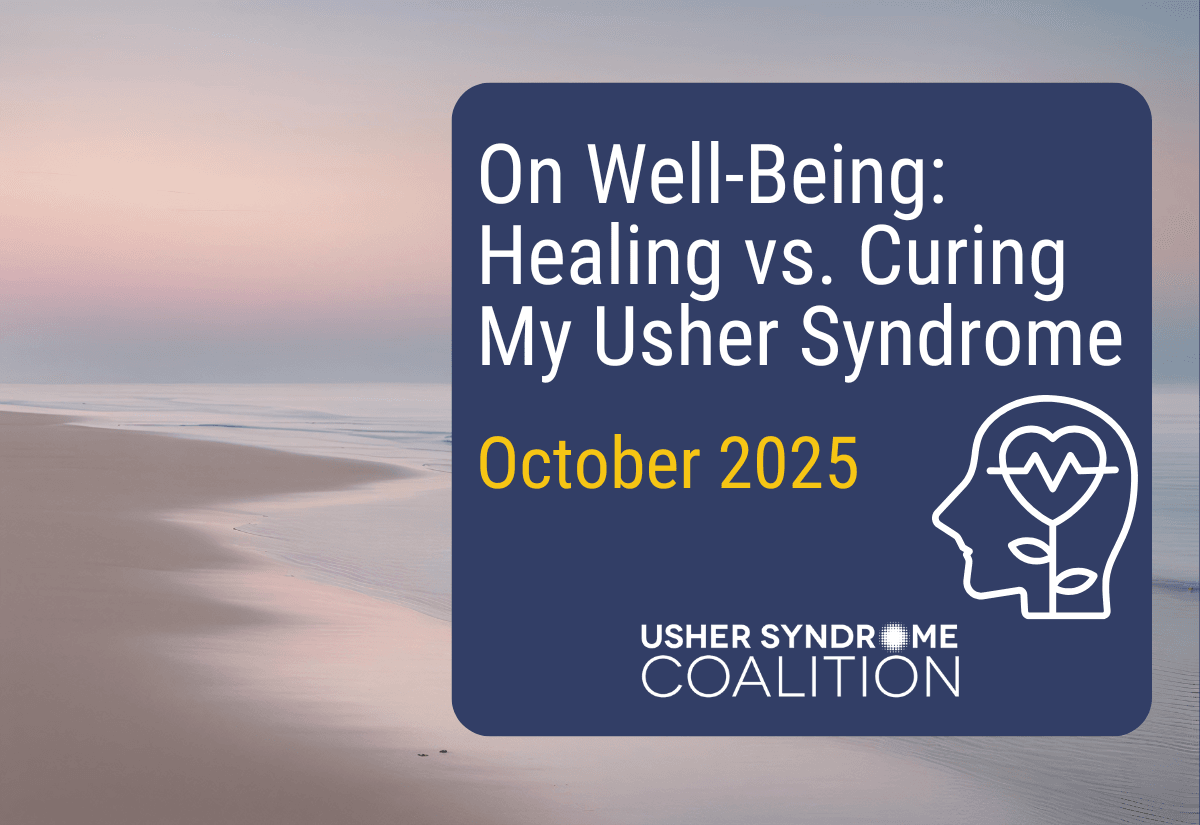
Healing vs. Curing My Usher Syndrome
by Meagan M., BSN, RN, HNB-BC
In today’s healthcare system, the primary focus is often on fixing or curing illness. While this approach has value, it can also negatively shape how we view health and wellness. As a nurse, I used to feel that I was failing my patients when their illnesses couldn’t be cured, when treatments didn’t “fix” them, or when they didn’t follow the healthy lifestyle changes or medication regimens I taught.
When I was diagnosed with Usher syndrome, that same mindset turned inward. I asked myself: How could I ever be healthy or whole if I had a progressive disease that could not be cured? This way of thinking was toxic, unforgiving, and deeply discouraging.
A Cure-Centered System
Throughout my nursing career, I often wondered: Is this what nursing really is? Didn’t Florence Nightingale emphasize the environment theory—focusing on nutrition, observation, communication, and supporting the patient’s own inherent ability to heal? (Nightingale, 1860/1969).
If healing simply meant being rid of disease, then wouldn’t most people living with chronic conditions or disabilities be excluded from ever being considered healthy or well?
In nursing school, we spoke of holistic care—caring for the whole person. At first, it seemed simple, even obvious. But it wasn’t until I pursued a nine-month nurse coaching program, became board-certified in holistic nursing, and immersed myself in the holistic healthcare model that I truly began to understand the difference between our current illness-driven system and a healing-focused model.
Redefining Healing
Dr. Janet F. Quinn describes a healing healthcare system as “a true healthcare system in which people can receive adequate, nontoxic, and noninvasive assistance in maintaining wellness and healing for body, mind, and spirit, together with the most sophisticated, sometimes invasive curing technologies available” (Quinn, 1992, p. 29). This definition helped me realize that I could still be a healthy person, even while living with a progressive disability.
In holistic nursing, healing is defined as “a lifelong journey into wholeness, seeking harmony and balance in one’s life and in family, community, and global relations. Healing involves the physical, mental, social, and spiritual processes of recovery, repair, renewal, and transformation that increase wholeness and coherence. It is an emergent process of the whole system—body, mind, spirit, and environment—coming together at a deep level of inner knowing. Healing can lead to greater understanding and meaning, and may occur with or without curing.” (Dossey, Keegan, & Guzzetta, 2005, p. 7)
These perspectives allow me to view myself as whole. I can acknowledge my progressive disability while also recognizing that I am enough. My mental and emotional health matter, my spirit is resilient, and I can live in balance. I am healthy.
Living Whole with Usher Syndrome
As a nurse, I have come to embrace the importance of meeting patients where they are. Maybe they don’t want to change their lifestyle habits. Maybe their priority is improving connections and relationships. Each of us has the right to define what wellness means in our own lives.
I wonder if others share the perspective I once held - believing that health was impossible without a cure - or the frustration of hearing from a system that says you cannot be healthy because you cannot be cured.
Both as a nurse and as a person living with Usher syndrome, I want to empower you to be the expert on your own condition. Fiercely share with your care team, your community, and your family what being well and healthy looks like for you.
An Invitation to Reflect
How do you define health in your own life—especially when a cure isn’t possible yet? What does being well look like for you, your family, or your community?
I invite you to reflect on this, and if you feel comfortable, share your perspective with others. In doing so, we begin to transform not only how we see ourselves, but also how healthcare systems see us.
References
Dossey, B. M., Keegan, L., & Guzzetta, C. E. (2005). Holistic nursing: A handbook for practice (4th ed.). Jones & Bartlett.
Nightingale, F. (1969). Notes on nursing: What it is and what it is not (Original work published 1860). Dover Publications.
Quinn, J. F. (1992). The politics of caring: From healing to holism in health care. NLN Press.
About Meagan
Meagan has worn hearing aids since she was three years old and graduated with her BSN in 2009. At 23, she was diagnosed with Usher syndrome, a moment that changed how she thought about health, healing, and life. She lives in Redmond, Oregon, with her high school sweetheart (now husband) and their three kids.
She’s extremely proud of her Awesome Moms with Ush Facebook group, where she connects with and supports other moms living with Usher syndrome. After spending a few years at home raising her children, Meagan reignited her love for nursing by becoming board-certified in holistic nursing. Today, she’s back to working full-time as an RN while balancing family life, advocacy, and community building.







